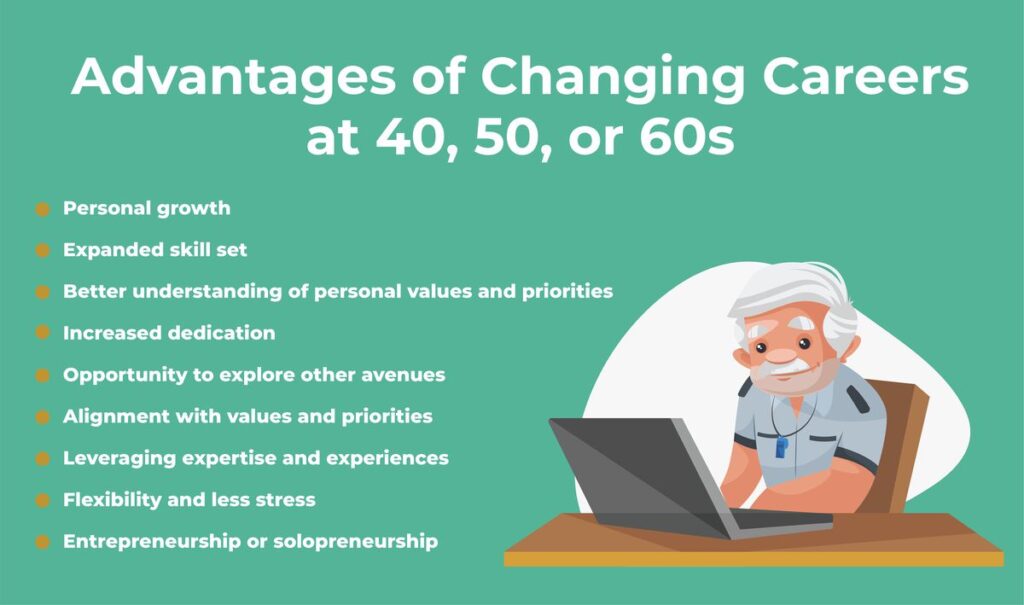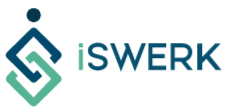
Introduction
Imagine being in your 50s, feeling stuck in a job that no longer fulfills you, and yearning for a change. You’re not alone. Career change statistics show that most workers change their careers at the average age of 39, and 11% of workers over the age of 50 wish to switch careers. In fact, 82% of respondents in a survey of older workers reported having successfully switched to a new career after the age of 45. This is a testament to the fact that it’s never too late for a career change!
What holds you back from switching careers at 40, 50, or 60?
Several factors can hold back people from making a late-career change. These include:
- Age-based discrimination: Navigating a mid-life job change can be tough due to age-based discrimination. The fear of restarting, appearing inexperienced, or outdated often hinders personal development and job satisfaction.
- Uncertainty and instability: Changing careers in midlife can bring uncertainty, especially if one must start from scratch or compete with more experienced candidates.
- Financial constraints: Mid-career changes may result in trouble obtaining a job due to age perception, low pay, or, in extreme situations, being kicked out of the organization or workforce. This can result in financial constraints that hold people back from making a late-career shift.
- Lack of the right skills: Not having the necessary skills for the desired career can be a barrier to making a late-career change. This can lead to a lack of confidence and reluctance to pursue a new path.
- Limited networks: Inadequate professional networks can make it challenging to transition to a new career, as networking is essential for finding opportunities and support during the transition.
Here’s the big reveal…
You are not starting from scratch. Your prior profession has given you a wealth of knowledge, experience, and abilities that can help you succeed in your future endeavor. Don’t underestimate your worth.
Explore these practical steps:
- Leverage transferable skills.
- Stay updated on industry trends.
- Engage in effective networking.
- Demonstrate adaptability.
- Embrace adaptation and commit to learning new skills, overcoming age-associated limitations to pursue lifelong ambitions, regardless of age.
Benefits of a Late Career Change
Here are the advantages of a late career change:

- Personal growth: Career change can lead to personal growth and job satisfaction, with 78% of individuals who have ventured into new career paths reporting higher levels of job satisfaction.
- Expanded skill set: Changing careers can provide the opportunity to take on more skills or expand the ones you already have, which can improve your future marketability in the job market. This gives you a solid foundation for overcoming new challenges and making important contributions to your chosen industry.
- Better understanding of personal values and priorities: As you get older, you may have a better idea of what you want from life, which can help you make more informed career decisions.
- Increased dedication: People who change careers later in life are often more committed to their new career, as they have considered their choices more carefully before committing to a new path.
- Opportunity to explore other avenues: Changing careers can give you the chance to explore other fields and be more creative, leading to improved self-esteem and a sense of purpose in your new role.
- Alignment with values and priorities: A career change can allow you to pursue meaningful work that aligns with your values and priorities.
- Leveraging expertise and experiences: A career change can help you leverage your expertise, experiences, and confidence built over decades.
- Flexibility and less stress: A career change can provide more flexibility and less stress, easing the transition into retirement.
- Entrepreneurship or solo-preneurship: Changing careers can open up the opportunity to be your own boss through entrepreneurship or solopreneurship.
Best Jobs for a Late Career Change
Some of the best jobs to break into when you’re in your 40s or 50s include:
- Executive roles: With experience and expertise, you can transition into executive roles, such as CEO, CFO, or COO.
- Healthcare: The healthcare industry always needs skilled professionals and offers a wide range of career opportunities.
- Technology: The technology industry is continually growing, providing several job opportunities for people seeking change.
- Administrative positions: Although they don’t sound flexible, these professions can provide growth opportunities and a healthy work-life balance.
- Sales and marketing jobs can be fulfilling and provide opportunities for growth, particularly in sectors like technology and healthcare.
- Consulting: Consulting positions can be ideal for those with experience and knowledge in each industry, as they frequently demand problem-solving and strategic thinking.
- Education: Teaching or educational roles can be fulfilling and offer opportunities for lifelong learning and growth.
- Hospitality: The hospitality industry offers various roles, from front-desk positions to management, and can be a good fit for people who enjoy working with others.
- Retail management: Retail management positions might suit people with sales and customer service expertise because they frequently involve strong communication and leadership abilities.
- Medical record technician: Medical record technicians are responsible for keeping and organizing patient information. The role is ideal for people who are detail-oriented and well-organized.
What Remote Work Can Offer When You Switch Careers
For individuals looking to make a late-career change, remote work can be a practical step to help individuals overcome age-associated limitations and pursue a late-career change. A work-from-home setup offers the opportunity to explore new industries or roles without location constraints.
This can be particularly appealing for those who have accumulated a wealth of experience and skills but are seeking a fresh start or a new challenge in their professional lives.
Additionally, remote work allows individuals to maintain a better work-life balance and potentially extend their careers by avoiding the physical toll of commuting and office-based stress.

Here’s how individuals benefit from a work-from-home setup:
- Flexibility and Autonomy: Telecommuting or virtual work allows people to manage their schedules and work environment and learn new skills at their own pace and in comfort.
- Access to Training and Resources: Many remote work arrangements include online training, webinars, and digital resources to help people learn new skills.
- Improved Communication Skills: People working from home often need strong written and verbal communication skills. The need to communicate effectively in a virtual setting can help people to improve and adapt, regardless of age.
- Adaptation to Technology: Work-from-home individuals use various digital tools and platforms, which can help late-career shifters become more tech-savvy and adaptable to new technologies, overcoming age-related bias and unfamiliarity with digital tools.
- Enhanced Self-Motivation and Time Management: Remote work requires self-discipline, time management, and self-motivation, which might assist persons in developing a proactive attitude to learning new skills and overcoming age-related restrictions.
- Increased Job Performance: Employees can learn new things and get more done at work while working from home, which can help them be more flexible and improve their skills.
Explore Career Options with iSWerk
iSWerk is a platform that helps individuals explore career options and make informed decisions about their future.
As a remote work expert situated in the Philippines, iSWerk empowers their remote professionals with cutting-edge training, state-of-the-art infrastructure, and premium services.
You can find the right career path that aligns with your skills, interests, and goals with iSWerk.
By considering executive roles, healthcare, technology, and remote work, you can explore various career options.
Discover Your Next Career Move with iSWerk!
